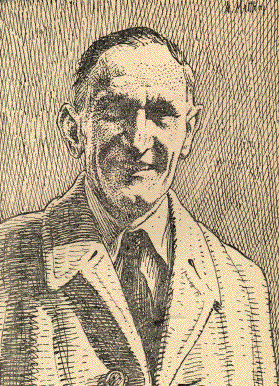
Martin Niemöller was born in Westphalia in 1892 and joined the Imperial German Navy as a cadet and entered the U-boat service in 1915, becoming the commander of UC67 in 1918 and compiling an heroic war record. Unwilling to serve in a republican navy, Niemöller resigned his commission in 1918, entered a seminary, and was ordained a Lutheran minister in 1924.
Even though Niemöller was a staunch German nationalist who had voted for the Nazis in every election, almost as soon as Hitler came to power Niemöller began to oppose him for undermining the Christian faith in Germany. Shocked at the Nazi attempt to insert an “Aryan Paragraph” into the creed of the German Evangelical [Lutheran] Church, Niemöller formed the Pastors’ Emergency League in 1933 and later the independent German Confessing Church. Though under Gestapo surveillance from the beginning of 1934, Niemöller was a popular figure and the Nazis held off on arresting him until 1937. Though a court found him guilty of “malicious gossip,” he was sentenced only to the time he had already served and released. Instead of being allowed to go free, however, Niemöller was immediately re-arrested as “the Führer’s personal prisoner” and sent to the Sachsenhausen concentration camp.
During his imprisonment, Niemöller went through a crisis of faith and considered becoming a Catholic. Seeing a potential conversion to Catholicism as effectively “decapitating” the German Confessing Church, in 1941 Niemöller was transferred to Dachau where he was housed with Catholic priests. Rather than push Niemöller into conversion, this experience had the opposite effect, both strengthening his commitment to Protestantism and making him a life-long advocate of the ecumenical moment.
At war’s end, Niemöller was liberated by American troops. With the re-constitution of the German Evangelical Church after the war, Niemöller became one of the authors of the Stuttgart Confession of Guilt which admitted the church’s failure in the face of the moral challenge of Nazi tyranny. Niemöller wrote:
For long years we may have fought in the name of Jesus Christ against the spirit that found its terrible expression in the National Socialist rule of violence; yet we accuse ourselves for not speaking out more courageously, praying more faithfully, believing more gladly and loving more ardently.
In subsequent years Niemöller served as president of the Hessian regional church, opposed German re-armament, worked for greater understanding with the Soviets, and championed the causes of disarmament and world peace. He died at Wiesbaden in 1984.
Recently I found another perspective on him in Albert Speer’s memoir, “Inside the Third Reich.” Speer had first been Hitler’s architect and later Armaments Minister. Of all defendants at the Nürnberg war crimes trials, only Speer admitted any guilt for the crimes of the Nazi regime. Speer wrote of Niemöller:
A few days later a large bus drew up on the prison yard. A whole bus-load of “tourists” was quartered with us, among them [former Reichs Bank President, Hjalmar] Schacht and General [Georg] Thomas, the former chief of the Armaments Office. Also among the bus passengers were prominent prisoners from German concentration camps who had been liberated by the American in South Tyrol, taken to Capri, and then transferred to our camp. Word went around that Pastor Niemöller was among them. We did not know him personally, but among the new arrivals was a frail old man, white-haired and wearing a black suit. The [aircraft] designer [ and engineer, Anton] Flettner, [aircraft designer, Ernst] Heinkel and I agreed it must be Niemöller. We felt great sympathy for this man so visibly marked by many years of concentration camp. Flettner took it upon himself to go over to the broken man and express our sympathy. But he had no sooner addressed him than he was corrected: “Thyssen! My name is Thyssen. Niemöller is standing over there.” And there he stood, looking youthful and self-possessed, smoking a pipe — an extraordinary example of how the pressures of long imprisonment can be withstood.
I think this is a wonderful example of how God gives us the strength to persevere when we see His plan for us and do the right thing. It seems to me that if we have but a fraction of Niemöller’s bravery and trust in God then we can withstand anything the world can throw at us. It is also good to keep in mind the advice of Saint Jean-Marie-Baptiste Vianney, the Curé d’Ars: “God commands you to pray, but he forbids you to worry.”


No comments:
Post a Comment